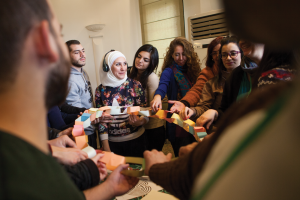
TRAUMA AWARENESS SUPPORT IS ‘AS IMPORTANT AS BREAD: ONE FEEDS OUR SPIRITS AND THE OTHER OUR BODIES.’ —Syrian Orthodox Church clergy member
WHEN DOUG AND NAOMI ENNS began their work as Mennonite Central Committee (MCC) Representatives for Lebanon and Syria in August 2013, Strategies for Trauma Awareness and Resilience (STAR) program principles traveled with them. “We had taken STAR I prior to our arrival and knowing its strengths, thought it would be good to try,” said Naomi Enns.
The Enns posited that the benefits of bringing a more robust and integrated STAR program to the region were exponential: Through the creation of shared safe space, STAR trainings facilitate understanding of trauma and help participants implement strategies and tools to stop cycles of violence and find ways towards healing – within themselves, those they are in relationship with, and the broader community. Among the many beneficial results of STAR training are increased resiliency and networking of trauma-informed partners and caregivers across faith traditions and organizations.
From the first training with Syrian Christians three years ago, STAR trainings – and the unique annual follow-up gatherings of participants – are now an integral contributor to MCC’s work in the region, which continues under Kate and Garry Mayhew, Lebanon and Syria representatives since May 2017 (Naomi and Doug Enns are now Western Europe reps).
From EMU’s STAR program, Elaine Zook Barge and Vernon Jantzi have provided trainings. From MCC, the trainers and assistants have included Luzdy Stucky, associate for migration and peacebuilding with MCC West Coast; Krista Johnson Weicksel MA ’10, peacebuilding coordinator; Beth Good, health coordinator; and Heather Peters, restorative justice coordinator. Fadi Abi Allam, director of the Lebanon NGO Permanent Peace Movement, and Karen Friesen, MCC representative for Egypt, have facilitated follow-up gatherings.
Approximately 60 people, of increasingly diverse backgrounds, have participated. They come from a range of NGOs and church-based partners. Participants are male and female, Christian (Orthodox and evangelical) and Muslim, and from Lebanon, Egypt, and a diversity of rural and urban areas in Syria. Two trainings have included Palestinian refugees working for Lebanese partners.
“This series of 5-day STAR trainings in Lebanon has been a key part of MCC’s disaster response to the Syrian crisis, says Johnson Weicksel, herself a STAR trainer. “STAR for MCC Lebanon/Syria partners has transformed those on the front lines of caregiving in crisis.”
Weicksel notes that the program’s careful, intentional implementation, including an annual follow-up gathering, has built strong ties between both individuals and partner organizations, which often send staff for further training. Organizations report stronger resiliency in STAR-trained staff.
“I know myself better now and I know that I’m resilient in the trauma I’m going through,” said one participant, a Muslim who works alongside Christians in Aleppo and has tailored her STAR-related knowledge to work with youth.
An important part of the training is learning to recognize actions, reactions and behaviors that occur in the midst of or as a result of trauma. Understanding those physical and emotional responses leads to a better understanding of how to deal with such experiences in more positive ways, and to help others understand as well.
“I used to only feel the trauma, now I can see it,” said one Palestinian participant.
The training also provides a safe and shared space in which to grieve and grow. One male participant, whose family fled from Aleppo to the coastal city of Tartus, offered this moving description:
Sometimes when you have to move a lot and lose the things that used to make you feel safe, it’s difficult to build new friendships, a safe environment, a place where you feel like you fit in. But here, you feel everyone is the same. When you speak about the things that happened to you, you find other people felt the same way at some point. Or they’re feeling the same way. You feel accepted. It’s really difficult to explain in words. You need to experience it. It gives you a different kind of strength that’s not available elsewhere, even sometimes in our own homes.
For Naomi Enns, sharing in the laying of a foundation of resiliency will always be a treasured experience. Each session and following contact with participants affirmed the healing power of the STAR training, in which “mentors and teachers who understand trauma well help others through participatory approaches to gain skills that last a lifetime.”
“To speak about one’s trauma and to be heard … there healing began,” she says. “Among people who care enough to listen, their story becomes a statement that they are able to live in the present and to step into the future with a bit more hope.”